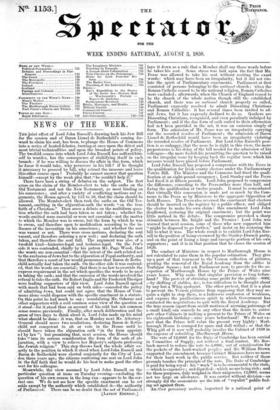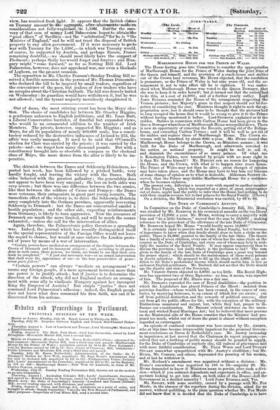NEWS OF THE WEEK.
TICE joint effect of Lord John Russell's drawing back his Jew Bill for the session and of Baron Lionel de Rothschild's coming for- ward to claim his seat, has been, to plunge the House of Commons into a series of heated debates, turning at once upon the driest and most trivial technicalities and upon the broadest points of policy. The twofold course into which Lord John Russell has suffered him- self to wander, has the consequence of stultifying itself in each branch : if he was willing to discuss the affair in this form, which
• he`knew it would take, why persevere in his bill ? if he thought it necessary to proceed by bill, why retract the measure and leave this other course open ? Probably he cannot answer that question himself—except by the weak plea that," he couldn't help it." There have been a string of debates on the subject. The first arose on the claim of the Member-elect to take the oaths on the Old Testament and not the New Testament, as most binding on his conscience ; and after a variety of conflicting motions and ar- guments, the House agreed, by 113 to 59, that the claim should be allowed. The Member-elect then took the oaths on the Old Tes- tament, omitting in the abjuration-oath the words "on the true faith of a Christian." Then arose a debate on the multiform ques- tion whether the oath had been taken or not taken ; whether the • words omitted were essential or were not essential—not the matter
-to which the Member was to swear, but the form ay which he was
• to swear, and therefore open to modification according to the in- fluence of the invocation on his conscience ; and whether the seat was vacant or not. There were cross motions, declaring the seat vacant, and therefore ordering a new writ ; and declaring the oath taken, and therefore the seat full. The argument was also of a twofold kind—historico-legal and technico-legal. On the Jew's -side it was contended, chiefly by his patron Mr. Page Wood, that the words are non-essential—that the intent of the oath related not to the exclusion of Jews butte the abjuration of Papal authority, and that therefore a court of law would pronounce that Baron de Roths child actually had taken the oath. On the other side it was contend- ed, that the words are essential; that there is no law to override the express requirement in the act which specifies the words to be used in taking the oath; and that the omission of the words involved the refusal to take the oath. Sir Robert Inglis and Sir Frederick Thesiger were leading supporters of this view. Lord John Russell agreed with much that had been said on both sides—conceded the policy of admitting Jews but could not agree that the House of Com- mons alone could dispense with the specific enactment in a statute. On this point he had much to say; scandalizing Mr. Osborne and
, other supporters with a cold common sense view of the question as it stood—for it „stood thus on account of his cold but not common sense course previously. Finally, after much deliberation and the • gram of two days to think about it, Lord John made up his mind . what should be done : it was, that on Monday next Mr. Attorney-
General should move two resolutions, declaring Baron de Roths- child not competent to sit or vote in the House until he should have taken the abjuration oath "in the form appoint- ed by law " ; but promising that, next session, the House should take into its serious consideration the form of the oath of ab- juration, with a view to relieve her Majesty's subjects professing the Jewish religion? This step throws back the whole affair ex- .aetly to the position in which it stood when Lord John Russell and , Baron de Rothschild were elected conjointly for the City of Lon- • don three years ago ; the citizens conferring one seat on Lord John in the full faith that he would do his best to make good the other seat for his colleague. Meanwhile, the view assumed by Lord John Russell on the particular question at issue on Tuesday evening—excluding the question of his own course in the long run—appears to be the ()or- , met one. We do not see how the specific enactment can be set aside except by the authority which established it—the authority of Parliament. There can be no doubt that the act of Parliament [LATEST EDITION.] lays it down as a rule that a Member shall say those words before he takes his seat. Some stress was laid upon the fact that Mr. Pease was allowed to take his seat without reciting the exact words : which may have been an irregularity, but it did not vio- late the spirit of Parliamentary enactments. Parliament at first consisted of persons belonging to the national church ; when the Roman Catholic ceased to be the national religion, Roman Catholics were excluded ; afterwards, when the Church of England ceased to be the church of the whole nation though still the established church, and there was no national church properly so called, Parliament expressly resolved to admit Dissenting Christians and Roman Catholics : it has several times been invited to ad- mit Jews but it has expressly declined to do so. Quakers are Dissenting Christians, recognized, and even peculiarly indulged by Parliament; and if the due form of oath suited to their affirmation had Jut been provided in the act, it was an omission simply of form. The admission of Mr. Pease was an irregularity carrying out the recorded resolve of Parliament ; the admission of Baron Lionel de Rothschild would have been an irregularity violating the recorded resolve of Parliament. But Lord John Russell's posi- tion is so unhappy, that the more he is right in this view, the more preposterous is his delay of the bill needed for the admission of his colleague—the more foolish his permitting the question to be raised on the irregular issue by keeping back the regular issue which his measure would have placed before Parliament. . Lord John Russell has proposed a compromise with the Peers in the qualification for Irish county electors under the Parliamentary Voters Bill. The Minister and the Commons had fixed the quali- fication at an eight-pound occupancy; Lord Stanley and the Peers had fixed it at fifteen pounds. Lord John proposed to compromise the difference, conceding to the Peers rather more than half and fixing the qualification at twelve pounds. It must be remembered that virtually this concession is made not so much by the Com- mons to the Peers as by Ministers to the aggregate Opposition of both Houses. The Peers also reversed the enactment that electors should be inserted on the register by a public officer, and obliged the elector to make his own claim : this amendment Lord John disallowed, restoring the original enactment ; but the point was little noticed in the debate. The compromise provoked a sharp skirmish between Mr. Bright and the Premier : Lord John was warned that next session, some of those who now supported him "might be disposed to go further," and insist on his restoring the bill to what it was. The whole result is to exhibit Lord John Rus- sell in the position of being overawed by the Stanley-Disraeli party, and on the point of losing a large and energetic portion of his own supporters ; and it is in that position that he closes the session of 1850.
The conduct of Ministers in respect to Marlborough House is not calculated to raise them in the popular estimation. They give up a part of that tenement to the Vernon collection of pictures, pending the removal of the Royal Academy from the edifice in Trafalgar Square ; but ask Parliament now, to provide for the oc- cupation of Marlborough House by the Prince of Wales nine years hence. Why make that singular provision so long before- hand ? The pretext of obtaining some profit for the public-8001. —by shifting of stables, &c.' is too ridiculous to be thought about by any but a Whig apologist. The other pretext, that it is a plan to prevent the Vernon pictures from supposing that they may ac- quire a right to stop there, is a ludicrous confession of weakness, and exposes the pusillanimous spirit in which Government has conducted the negotiations to quit with the Royal Academy. But the true reason (apart from occult motives of accruing patronage of a small kind) can scarcely be any other than the desire to antici- pate other Cabinets in making a present to the Prince of Wales on his eighteenth birthday—nine years beforehand! We do not ex- pect that the Prince will value the present very highly : Marl- borough House is cramped for space and dull withal ; so that the Whig gift of it now will probably involve the Cabinet of 1859 in the expense of rebuilding Illarlborough House. • The vote of 12,000i. for the Duke of Cambridge has been carried in Committee of Supply, not without a final contest. Mr. Roe- buck moved to reduce the vote to 5,000/., out of consideration for the pockets of the hard-worked people ; and Mr. William Brown supported the amendment, because Cabinet Ministers have no more for their hard work in the public service. But neither of these grounds touches the principle of the vote. The Duke of Cambridge is paid for being royal : his " work " is to be ornamental to the state, —which is expensive ; and dignified—which means being rich; and for those purposes, duly weighed in their exigencies, 12,0001. seems not too large an allowance. It was carried without division—so strongly did the economists see the tide of "royalist" public feel- ing set against them.
Anther pecuniary matter, important in a national point of
view, has received fresh light. It appears that the British cheims on Tuscany amounttn Ake aggregate, aftrr abatements imakte'on considerations not fully-explained, to 1,630/. Buefor the reco- very of that sum of mangy Lord Palmerston hopes to obtain' the "good offices" of Sardinia—not the " arbitration',",for he is "the Minister of England," and he will not trust the disposal of British property to any alien government. If it were necessary to sato- war with Tuscany for the 1,530/.,—in which war Tuscany would, of course, be supported by Austria, and perhaps Russia, France remaining doubtful,—we should most likely have the support of Piedmont ; perhaps Sicily too would forget and forgive ; and Him- gary-might " come forward," as far as Notting Hill did. Lord Pa]merston, however, does not apprehend warpnor even a blockade of Leghorn, on thepresent occasion. The opposition to Mr. Charles Pearson's Sunday Trading Bill re- ceived a forcible accession in the person of Mr. Thomas Duneombe ; who declared the bill to be inspired by small traders, regardless of the convenience of the poor, but jealous of Jew traders who have no scruples about the Christian Sabbath. The bill was fiercely baited on Wednesday its guardian would-have withdrawn it, but he was not ,allowed ; and the tyrant majority mercilessly slaughtered it.



























